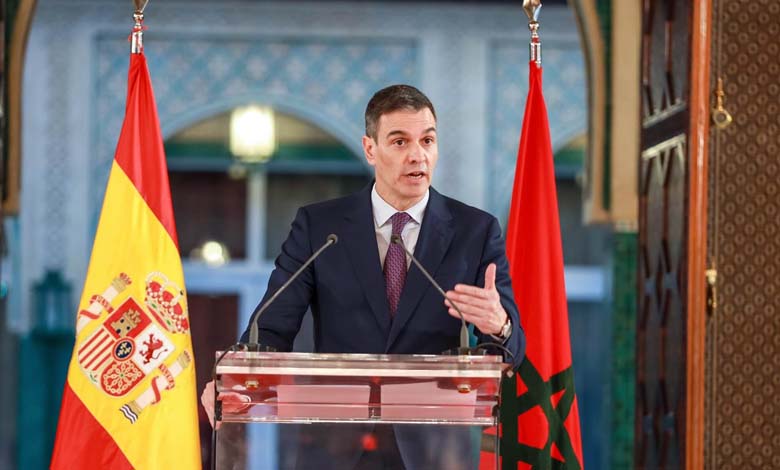Algerian Disappointment Over Spain’s Persistence in Supporting Moroccan Autonomy Proposal

Algeria is reaffirming its stance towards Spain, asserting its role in the conflict over the Moroccan Sahara, as without its support for the Polisario Front, its representatives would not have been able to attend the United Nations or the African Union The Spanish press has shed light on the cooling of relations between Algeria and Madrid, and the failure to achieve full reconciliation after the cancellation of the visit of Spanish Foreign Minister Jose Manuel Albares, scheduled for February 12, due to the Spanish minister’s refusal to discuss the issue of the Moroccan Sahara with his Algerian counterparts, while Moroccan-Spanish relations are making rapid progress and development at all levels.
Spanish reports confirm that the situation between Spain and Algeria has “deteriorated” after Spanish Prime Minister Pedro Sanchez’s visit to Morocco on February 21, where he met with King Mohammed VI and reaffirmed Madrid’s support for the autonomy initiative to resolve the Sahara conflict under Moroccan sovereignty. Algeria has suffered successive diplomatic setbacks, considering Morocco’s diplomatic success as a loss for itself. While Spanish-Algerian relations have suffered greatly, especially after Algeria suspended the “Friendship and Good Neighborliness” agreement, Moroccan-Spanish relations have improved significantly. This is evidenced by two visits by Pedro Sanchez to Morocco and his meeting with King Mohammed VI on one of them, as well as the success of both countries, along with Portugal, in winning the bid to host the 2030 World Cup, in what is the first Euro-African experience in organizing a similar massive event.
The Spanish newspaper “El Independiente” mentioned that the Spanish Foreign Minister has become a “persona non grata” by Algeria, due to his refusal to discuss the Sahara issue in Algeria, and his refusal to refer to this issue in any way during the preparation of his visit to meet his Algerian counterpart, Ahmed Attaf, leading Algeria to cancel the visit entirely. Diplomatic efforts made over the past two years to end the crisis with Algeria have failed due to disagreements over the preparation of the Spanish Foreign Minister’s visit to Algeria and Spain’s support for the autonomy proposal.
The situation even reached the point where Algeria threatened to cancel its gas supply contract to Spain if any of it were transferred to Morocco, which showed that Algeria is a party to the Sahara conflict, although it had previously been referred to as an “observer party.” Algeria has proven, through its stance towards Spain, that it is a party to the conflict. Without Algeria’s support, internationally unrecognized Polisario representatives would not have been able to attend the United Nations or the European Union.
Observers note that Spain, at the official level, has historically attempted to remain neutral in the conflict, but Sanchez has changed his position regarding support for autonomy as Morocco becomes increasingly crucial in the Spanish agenda compared to Algeria. In March 2022, Algeria recalled its ambassador from Madrid for consultation, as a protest against Madrid’s declaration of support for the autonomy initiative to resolve the Sahara conflict under Moroccan sovereignty, and then suspended in the middle of the year the friendship and cooperation initiative between the two countries and halted trade exchanges, except for gas, in an attempt to pressure Spain to reverse its position.
However, such pressure attempts have yielded no results, with Spain maintaining its position, and the crisis between the two parties lasting for 19 months, until Algeria began in November to make efforts to repair its relations with Spain, under unconvincing pretexts. Amid “disappointment” and “acceptance of reality,” with all political factions in Spain confirming the maintenance of the historical position in favor of the autonomy proposal in the southern provinces. The Spanish press stated that the first “strong signs” of the failure of Algeria’s plans and efforts to change Spain’s position were the agreement reached between Sanchez and Yolanda Diaz, leader of the “Sumar” alliance, an agreement that led Diaz to abandon her electoral promises to the Polisario Front to change Madrid’s position on the Sahara, leaving the leadership of the separatist front in a state of “astonishment and displeasure.
During months of Algerian diplomatic rupture policy, trade exchanges with Madrid were affected, with fuel exports remaining at low levels for fear of European sanctions, while relations between Rabat and Madrid saw unprecedented growth, with joint and revolutionary projects such as the organization of the 2030 World Cup. The international community now recognizes the reality of the artificial conflict in the region and sees the autonomy proposal as the only solution to end the suffering of detainees in the Tindouf camps.












